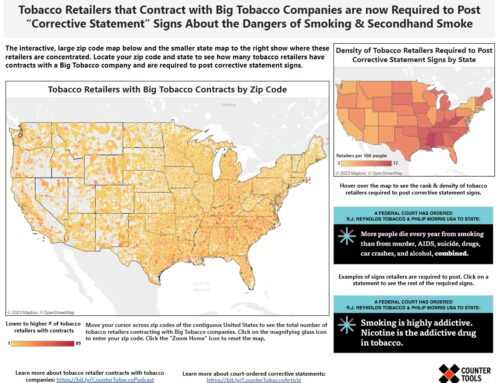Are you attending the American Public Health Association (APHA) Annual Meeting November 2-5 in Washington, D.C.? We hope to see you there! Counter Tools team members will be presenting on retail alcohol and cannabis topics:
ATOD Legal Epidemiology: Comparing Policies Across Jurisdictions | High-Risk Alcohol Retail: Local Data, National Impact (2044.0)
Presenter: Maria Kovell
Sunday, November 2 | 2:30 – 4:00 PM
Ready-to-go alcoholic beverages pose significant public health and safety concerns for young people. The flavoring, packaging, pricing, and marketing of these beverages are particularly appealing to young people and can lead to risky drinking behaviors. Alcohol pricing policies are some of the most effective strategies for reducing alcohol-related harms. However, evaluating these policies requires information on current prices, particularly for products that afford the most alcohol for the lowest price. This presentation highlights insights from the Retail Alcohol Data (RAD) collaborative, which conducted nationwide retail assessments of high-risk alcohol product availability, pricing, and advertising.
Commercial Determinants of Health 2.0 (A collaborative session with International Health section) | The rise of the commercial cannabis industry and its implications for public health (4058.0)
Presenter: Jacob Delbridge
Tuesday, November 4 | 8:30 – 10:00 AM
This presentation component will explore the commercial determinants of health (CDH) as they relate to the cannabis industries sector, examining how marketing strategies, policy advocacy, and other business practices can influence public health impacts. This may include product availability, design, placement, pricing, and key advertising approaches, as well as the influencing of local, state, and federal regulatory authority. Recognizing that cannabis commercialization is relatively young compared to other consumer product industries, and given the distinct social and legal backdrop of cannabis, there remains diverse viewpoints around profit-driven motives and public health responsibilities. Furthermore, U.S. cannabis-related criminalization has deepened cycles of poverty and economic disinvestment and disenfranchisement. Many U.S. communities of color have faced significant harms due to mass incarceration, institutionalized racism, and disproportionately applied enforcement practices. Accordingly, it is important to evaluate the growing yet fragmented rollout of cannabis commercialization and corporatization and its impacts to public health, including on the social drivers of health.
Learn more about the Alcohol, Tobacco, and Other Drugs section of APHA here.





